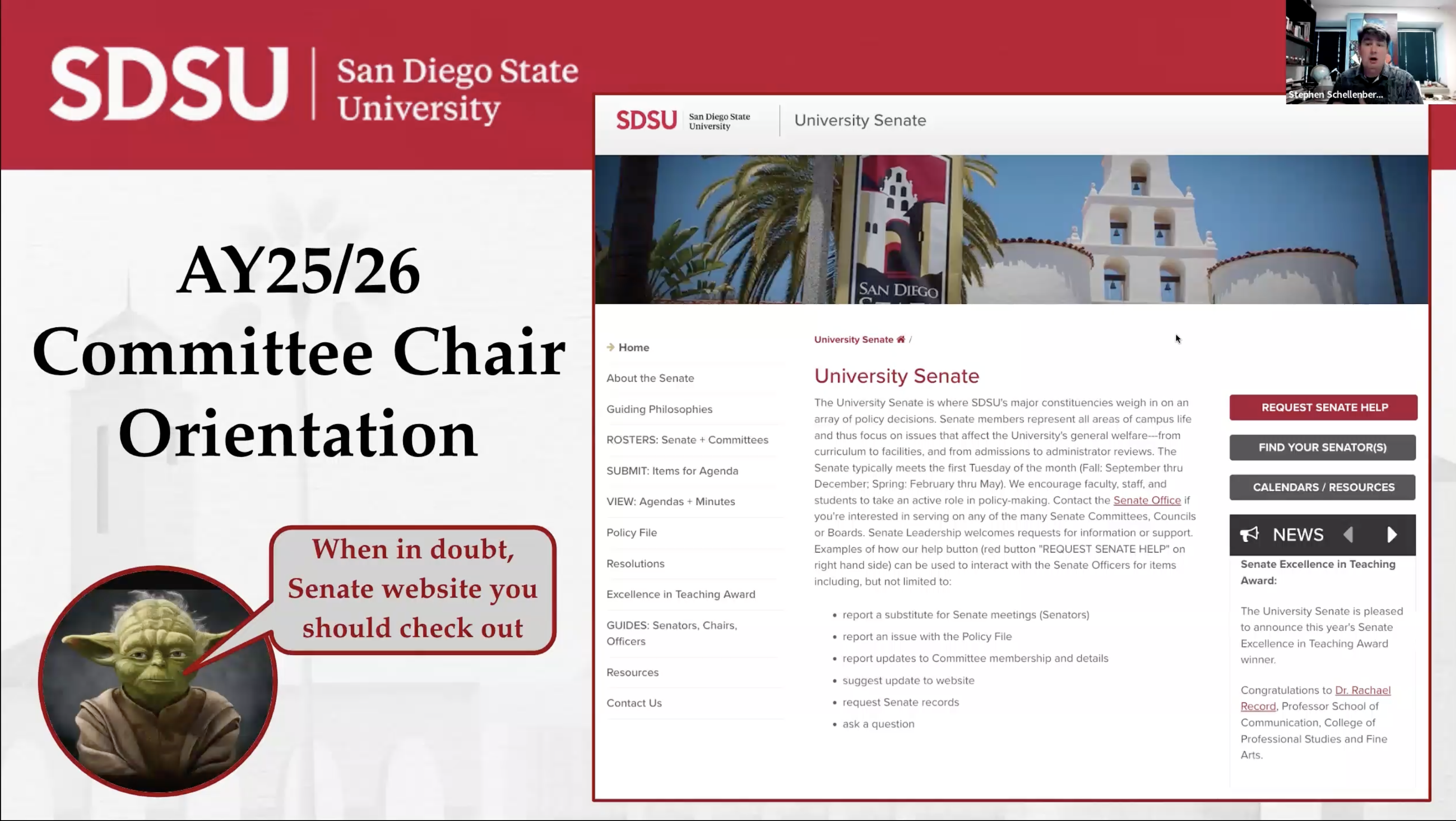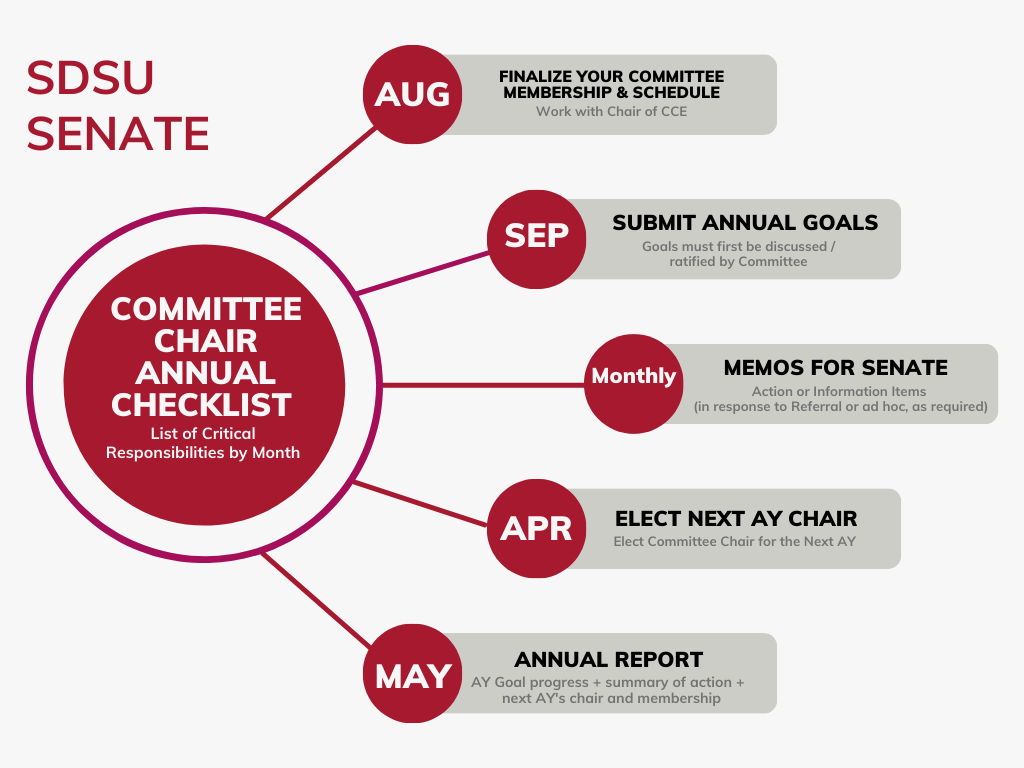Committee Chair Guide
Critical Resources / Quick Links
Use the Submit: SEC/Senate Agenda Items link to submit Information or Action Items / Memos for inclusion on a future SEC and/or Senate Agenda.
The Store: Committee Documents link takes you to the Senate Business Google Drive where each committee has a folder. In the folder, committees may store documents and materials, including agendas and minutes (mandatory for standing committees). These items are viewable by all Senators and those on Senate Listserv. These folders are not for submitting items for the SEC/Senate agendas.


- August: Finalize Your Committee Membership & Schedule. Work with Chair of CCE
- September: Submit Annual Goals. Goals must first be discussed/ratified by Committee
- Monthly: Memos for Senate. Action or Information Items (in response to Referral or ad hoc, as required)
- April: Elect Next AY Chair. Elect Committee Chair for the next AY
- May: Annual Report. AY Goal progress + summary of action + next AY's chair and membership
Annual Responsibilities and Resources
By the end of August
- Ensure all committee members have access to the committee’s official Senate Google drive folders.
- Ensure committee meetings are calendared for the entire academic year and all committee members have calendar invites. We recommend including links to relevant documents (e.g., agendas, etc.) within your calendar invites using the “Add description or a Google Drive attachment.”
- Review your committee membership using the online University Senate Roster, and:
- Send any changes to your committee’s meeting dates, times and locations/modality to [email protected].
- Send a list of vacancies or term updates for your committee to [email protected].
By the end of September
- Submit your Annual Agenda. Develop the committee’s Annual Agenda (list of priorities for the year) and save it in your committee’s Google Drive folder before submitting it as an Information Item.
- Email [email protected] and [email protected] if you have or expect to have a vacancy on your committee.
- Senate and Senate Core Committee Chairs do not appoint members to their committee (this includes students and staff). Per the Policy File, members are nominated by CCE or the Senate Chair and confirmed by the Senate. The Chair of CCE or Senate Chair will work with Staff Affairs to identify staff nominees and work with A.S. to identify student nominees. If there is a vacancy on your committee, and you have someone in mind who may want to serve on the committee, please include this information in your notification to CCE.
- Chairs are required to respond to Committee Roster Audits sent by CCE, Senate Officers, or the Senate Analyst.
- Develop your committee members to be future chairs! Committees that experience major leadership changes can falter or lose momentum in their work. The more engaged and involved your committee members are, the more likely they will be willing to chair when you are ready to step down. We encourage you to bring members to SEC/Senate meetings to co-present, have them keep minutes, or help with agendas or annual reports to build their experience and engagement.
- Unless otherwise stated in the committee charter, your committee must convene at least once per semester. However, you can set the schedule based on what is required for the work load (e.g., referrals, committee-initiated projects). When scheduling your meeting days and times, please using some sort of polling (e.g., Poll Everywhere) to ensure a meeting time that is inclusive of the vast majority, and ideally all, members.
- Quorum (PDF) is required for your committee to take formal action (e.g., voting) and is defined as 50% of all seats (vacant or filled). If quorum is not met, discussion can occur, but voting must wait until quorum is established.
- Voting counts are based on present and voting members. For example, if six members vote yes, four members vote no, and two members abstain, the vote would be 60%, thereby passing if a simple majority, but failing if a two-thirds majority.
- Ensure all members have calendar invites, Zoom links, and meeting materials well ahead of time to ensure a positive, productive, and engaged session. We strongly encourage you to provide all materials at least four business days before your meeting
- For larger committee projects, you may establish permanent or ad hoc (temporary) sub committees. Keep in mind that permanent subcommittees require an updated Committee Charter through a formal update to the University Policy File.
An Action Item calls for change to a formal policy or procedure and is voted on by the University Senate. Note that updates to your committee membership are sent to CCE who then submits all committee changes as an Action Item to the University Senate.
An Information Item describes an update on a project or status and does not require a University Senate vote.
Monthly submissions to the SEC/Senate meeting cycle are not mandatory, but if you do have Action or Information Items, then please follow the process below to ensure timely and effective work flow.
- Construct the Action or Information Item:
- Address your document to the University Senate.
- Do not combine information and action items in the same document – submit each item in a separate memo.
- Any policy file changes should be red-lined so members of the University Senate can easily discern what changes have been made to the policy. The sample Action Memo provided shows an example of red-lining textual changes.
- Save your to-be-submitted item as a PDF using the naming convention of year-month-day_action/info_committeename_brief description as per the following examples:
- 2023-08-22_action_sec_app_brief-description.pdf
- 2023-08-22_info_sec_app_brief-description.pdf
- 2023-09-05_action_senate_app_brief-description.pdf
- Submit the memo and related documents as PDFs by the stated submission deadline published in the Senate Calendar. Items received after the submission deadline for a given Senate meeting will be included on the agenda for the subsequent meeting.
Upon receipt of a Referral Letter from the Vice Chair of the University Senate:
- Bring the referral to your committee and organize/complete the work to address it. Be sure to include collaboration with any additional stakeholders, including other committees, programs, offices, etc., as appropriate.
- Use Trello (PDF), the web hosted referral chart, to input notes on your referral progress as needed.
- Submit an Action Item or Information Item as appropriate for inclusion in the Senate agenda (see instructions above) as your official response to the referral.
- Present on your item at the University Senate.
Guide: Managing Referrals in Trello (PDF)
Note: Chairs are responsible for checking Trello regularly and ensure all active referrals, even the ones that existed before you were chair, are addressed. If you have questions about the referrals in your committee's section of Trello, then please email [email protected].
In order to ensure information and documentation for each committee is preserved, all committees are assigned an official University Senate Google Drive folder. These folders must be kept organized and are meant to store committee documents such as:
- Annual Agendas
- Rosters
- Meeting Agendas & Minutes
- Action and Information Items
- Annual Reports
Note: Senate Core Committees are required to publish each agenda/minutes within 30 days of a meeting. Combining the agenda and minutes in one single document is the preferred method.
Report as needed to [email protected] and [email protected]:
- Committee membership changes during the year
- A member of your committee has stopped attending without explanation or communication, and does not respond to your inquiries.
Note: Typically students are not identified for committee seats until September, so you can expect them to begin attending in Sept/Oct of each year.
- Review the committee's charter in the Policy File (PF) for accuracy and assess if any updates to the charter are warranted. You can find your committee’s charter by downloading the most recent version of the Policy File and using the Find function (CTRL+F or Command+F) to search for the name of your committee. The charter is the PF section that defines the committee’s background, membership, functions, subcommittees, etc.
- Review any and all sections of the PF related to the committee’s work (e.g., CCE might review and/or update the policy governing how elections are run). If you aren’t sure which sections of the PF apply to your committee’s work, brainstorm some key terms. For example, CCE might connect with terms like elections, substitutes, committees, etc. If there is not already a list of policy file sections related to the work of the committee saved in the committee’s official Senate Google drive folder, we encourage you to create one and revise it as appropriate.
- If the committee feels updates to the charter or other sections of the PF are warranted, they should develop revised PD language and submit these as an Action Item for inclusion on the next agenda.
Note: It is recommended that each committee complete the annual policy review as early as possible each year, so that any proposed updates have the opportunity to get through the University Senate in that same year.
By Mid-April
- Elect a chair for the next AY during your March meeting (ex officio chairs, or chairs named by position, need not complete this step).
- Create a draft committee roster for the next AY by surveying committee members about their plans for AY 25-26. Get confirmation from all committee members – don't assume members will return because they have not yet completed their term (e.g., sabbatical). Your current roster is posted on the Senate website.
- Email the draft committee roster for the next AY and the name of the person who will serve as chair to [email protected] and [email protected].
- Collate your committee’s Annual Report and submit it as an Information Item for the April University Senate meeting. An Annual Report should include:
- Chair-elect for the next AY.
- Draft committee roster for next AY.
- Summary of committee work and accomplishments during the concluding AY, including work related to all assigned Senate referrals and non-referral action taken by the committee. Be sure to note any work in progress, identifying work that will conclude by the end of May, and work that will continue into the next AY.
- Draft agenda/goals for the next AY.
Note: Committee Chairs may submit a revised Annual Report for the concluding AY at the first meeting of the next AY if significant updates will be made between the April meeting of the University Senate and May 31.
Note: Campus Committees with Senate Appointed Membership are not required to submit an Annual Report (step 4), which includes the following committees: Bookstore Advisory, CFAC, Copyrights and Patents, Freedom of Expression, Honorary Degrees, Intercollegiate Athletic Council, PBAC, SDSU Press, Promotions & Tenure, Student Grievance, Student Health Advisory Board, Student Media, Teacher Prep, Transportation Advisory.

